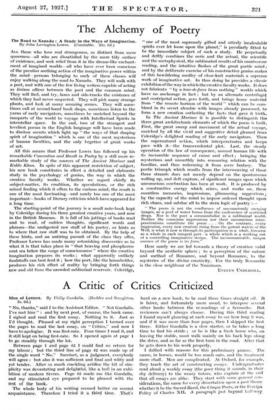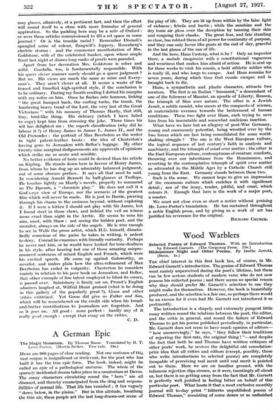A Critic of Critics Criticized " No, thanks," said I
to the Assistant Editor. " Not Guedalla. I've met him " : and by next post, of course, the book came. I sighed and read the first essay. Nothing to it. Just as. I'd thought. Pleased 'at my right perception I turned over the pages to read the last essay, on " Critics," and now I have to apologize. It was first-rate. Four times I read it, and it still kept on being first-rate. So I opened again at page 1 to go steadily through the lot. _ • Between page 1 and page 42 I could find no return for my labour.; but the third line of page 42 was made up of the single word " No." Succinct, as a judgment, everybody will agree : but also it was sufficient and final and witty and yet tender. After so much crackling artifice the bit of sim- plicity was devastating and delightful, like a bull in an exhi- bition of modern Sevres. Page 42 made me like Guedalla, and my stimulated eye prepared to be pleased with the rest of the book.
The whole body of his writing seemed better. on second acquaintance. Therefore I tried it _third time.. .That's
hard on a new book, to be read three times straight off. It is fairer, and fortunately more usual, to interpose several other books between the re-readings of a favourite. But reviewers can't always choose. During this third readhig. I found myself glancing at each essay to see how long it was, and if it was more than four pages, then I skipped the first thiee. Either Guedalla is a slow starter, or he takes a long time to find his stride ; or he is like a fresh horse who, on leaving the stable, must walk mainly On his back legs along the drive,- and as far as the first turn in the road. After that he gets down to his work properly.
- I dallied with reasons for this preliminary prance. The cause, in horses, would be too much oats, and the treatment more chaff. Men are complicated. At Oxford, for example, they teach the art of constructing essays. Undergraduates read aloud a weekly essay (the poor thing it sounds, in their. shy delivery) to the weary tutors, who explain at the end that all essays are alike. They start with some general con- siderations, the same for every dissertation upon a past the,* whether it be the Sacred Band, the Cinque Ports, or the Foreign Policy of Charles XII. A paragraph just beyond half-way may glance, allusively, at a pertinent fact, and then the effort will round itself to a close with more formulae of general application. So the padding here may be a relic of Oxford : or were these articles commissioned to fill a set space in some journal ? Or is the trouble racial ? Remember Disraeli's spangled sense of colour, Zangwill's foppery, Rosenberg's electric storms : and the commoner manifestation of Mrs. Goldstone, wife of the celebrated banker, upon whose ample front last night at dinner long ranks of pearls were paraded.
Apart from her decoration Mrs. Goldstone is sober and solid. Guedalla, too, is fundamentally responsible. With his queer clever manner surely should go a queer judgment ? But no. His views are much the same as mine and Every- man's. They aren't clever at all. It seems a waste of the teased and tinselled high-spirited style, if the conclusion is to be ordinary. During my fourth reading I dotted his margins with my notes on him. Once he flashes into humour, linking " the great humped back, the curling tusks, the trunk, the lumbering heavy tread of the Last, the very last of the Great Victorians " with his memory of Thomas Hardy, that still, tiny, bird-like thing. His delicacy (which I have failed to copy) kept him from stressing the joke. Three times his wit has delighted me : the superb classification (why did he labour it ?) of Henry James in James I., James H., and the Old Pretender : the portrait of Max Beerbohm as the writer in tight patent-leather boots : the idea of Chesterton's having gone to Jerusalem with Belloc's luggage. My other twenty-nine marginal disfigurements are approvals of opinions which strike me as acute and sensible.
No better evidence of taste could be desired than his article on Kipling. He stands down here in favour of Henry James, from whom he has dug up an admirably balanced judgment, out of some obscure preface. It says all that need be said. In considering Arnold Bennett he half-glances at Trollope. He touches lightly on Hardy's novels, properly to commend us The Dynasts, a " chronicle play." He does not call it a God's-eye view of Europe, nor the scenario of the greatest film which will never be made. He is just to Barrie, piercing through his charm to the ominous beyond, without exploring it. If I were a kitten I should not play with Sir James, lest I found steel in those claws, and behind the veil an iciness more cruel than night in the Arctic. He seems to miss his aim, most, with Shaw : not seeing the hidden poet, and the moralist, always on the side of the angels. He is wise enough to see in Wells the prose artist, which H.G. himself, dissatis- fiedly conscious of the pains he takes in writing, is ardent to deny. Conrad he examines with friendly curiosity. Perhaps he never met him, or he would have looked for tone-deafness in his style, after hearing but one of those amazing mispro- nounced sentences of mixed English and French, which were his excited speech. He sums up against Galsworthy, as novelist, and makes plain how the ultra-refinement of Max Beerbohm has ended in vulgarity. Chesterton he considers mainly in relation to his poor book on Jerusalem, and Belloc, that other example of fine talent employed to blind its owner, is passed over. Saintsbury is firmly sat on, Proust's English admirers laughed at, Wilfrid Blunt praised (what is he doing in this gallery of the popularly great ?), Gosse and other critics criticized. Yet Gosse did give us Father and Son, which wilt be remembered on the credit side when his bread-
and-butter contributions to journalism are forgotten. And so it goes on. All good : none perfect : hardly any of it really good enough : except that essay on the critics.
C. D.



































 Previous page
Previous page